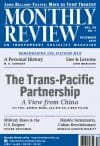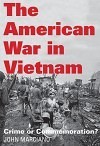Volume 68, Issue 07 (December)

In October 2016, the Sveriges Riksbank (Swedish Central Bank) Prize in Economic Sciences in Memory of Alfred Nobel—commonly but incorrectly called the Nobel Prize in Economics—was awarded to two European-born, U.S.-based economists, Oliver Hart and Bengt Holmström, for their work on contracts related to executive pay. Hart and Holmström were lauded for having theorized what was thought to be the optimal mix of risk and incentives in pay packages for corporate executives, thereby determining the appropriate combination of basic salary, bonuses, and share options. In other words, they received the Riksbank Nobel Memorial Prize for their efforts to rationalize the exorbitant paychecks of CEOs and other corporate leaders—a direct service to big business. | more…

Food has become a core contradiction of contemporary capitalism. Discussions of the economics and sociology of food and food regimes seem to be everywhere today, with some of the most important contributions made by Marxian theorists. Amid plentiful food production, hunger remains a chronic problem, and food security is now a pressing concern for many of the world’s people.… Despite the severity of these problems and their integral relation to the capitalist commodity system, it is generally believed that Karl Marx himself contributed little to our understanding of food…. [Yet] food for Marx was far more than a “passing interest”: in his work one finds analyses of the development of agriculture in different modes of production; climate and food cultivation; the chemistry of the soil; industrial agriculture; livestock conditions; new technologies in food production and preparation; toxic additives in food products; food security; and much more. Moreover, these issues are not peripheral, but organically connected to Marx’s larger critique of capitalism. | more…

Since announcing its foreign policy “pivot to Asia” shortly after the election of Barack Obama, the United States has made extensive use of its institutional and discursive power to encourage denationalization among developing countries whose economies chiefly rely on manufacturing and trade—part of its global strategic goal of expanding the hegemony of finance capital at the lowest possible cost. The development of the Trans-Pacific Partnership (TTP) is a case in point. This article analyzes the TPP’s strategy in targeting China, pointing out that the TPP is a battle for the terms of economic development and discourse in the twenty-first century, as well as an illustration of the ideology of technocracy and soft power. Lastly, we criticize the TPP’s erosion of economic sovereignty, which would effectively relegate the economies of developing countries to a form of semi-colonial extraterritoriality. | more…

In early 1970, Vice President Spiro Agnew had this to say about the so-called ’60s Generation: “As for these deserters, malcontents, radicals, incendiaries, the civil and the uncivil disobedients among our youth, SDS, PLP, Weathermen I and Weathermen II, the revolutionary action movement, the Black United Front, Yippies, Hippies, Yahoos, Black Panthers, Lions, and Tigers alike—I would swap the whole damn zoo for a single platoon of the kind of young Americans I saw in Vietnam.” This is a fascinating statement for multiple reasons and on multiple levels. To begin with, a single platoon of the kind of young Americans he saw in Vietnam went into a village we remember as My Lai and murdered 407 unarmed men, women, and children. On the same day, in the nearby village of My Khe, another unit of the same division murdered an estimated 97 additional Vietnamese civilians. While I personally did not participate in or witness killing on that scale, I and my fellow Marines routinely killed, maimed, and abused Vietnamese on a near-daily basis, destroying homes, fields, crops, and livestock with every weapon available to us, from rifles and grenades to heavy artillery and napalm.… It is no wonder, it turns out, that Agnew should be so fond of “the kind of young Americans” he saw in Vietnam, since he himself turned out to be a criminal who was forced to resign from his office in public disgrace. | more…

The Vietnam War was an example of imperial aggression.… Imperialism ultimately enriches the home country’s dominant class. The process involves “unspeakable repression and state terror,” and must rely repeatedly “upon armed coercion and repression.” The ultimate aim of modern U.S. imperialism is “to make the world safe” for multinational corporations.… U.S. imperial actions in Vietnam and elsewhere are often described as reflecting “national interests,” “national security,” or “national defense.” Endless U.S. wars and regime changes, however, actually represent the class interests of the powerful who own and govern the country. Noam Chomsky argues that if one wishes to understand imperial wars, therefore, “it is a good idea to begin by investigating the domestic social structure. Who sets foreign policy? What interest do these people represent? What is the domestic source of their power?” | more…

David Vine, Base Nation: How U.S. Military Bases Abroad Harm America and the World (New York: Metropolitan, 2015), 418 pages, $35.00, hardcover.
The United States maintains about 800 military installations around the world, and the number is growing, despite partial withdrawals of troops from Iraq and Afghanistan and scaling back of major European bases. The continued expansion…has come mainly through a series of smaller “lily pad” installations, originally proposed by Defense Secretary Donald Rumsfeld, that are now being built in Africa, Eastern and Central Europe, Latin America, the Middle East, and beyond.… [David] Vine, a professor of anthropology at American University [and author of Base Nation], visited more than sixty current or former bases in twelve countries and territories. Although scholars such as Chalmers Johnson, Cynthia Enloe, and Catherine Lutz, as well as contributors to Monthly Review, have for decades sounded the alarm about the ever-expanding global network of U.S. military bases, Vine’s new study provides a comprehensive update, persuasively documenting the ways that “far from making the world a safer place, U.S. bases overseas can actually make war more likely and America less secure.” | more…

Margaret Randall, Haydée Santamaría, Cuban Revolutionary: She Led by Transgression (Durham, NC: Duke University Press, 2015), 248 pages, $23.95, paperback.
In the early 1950s, Haydée Santamaría Cuadrado moved from a rural Cuban sugar plantation to Havana, to live with her younger brother Abel. Together, they would help to establish a revolutionary movement that would change the history of their country. Haydée, as she is known throughout Cuba—Yeyé to her friends—was one of only two women among 160 men who took part in attacks on Batista’s army barracks at Moncada and Bayamo on July 26, 1953, which sparked the Cuban Revolution.… In her recent book, poet and scholar Margaret Randall, who lived in Cuba in the 1970s and became friends with Haydée, has captured the essence of this exemplary woman. | more…






